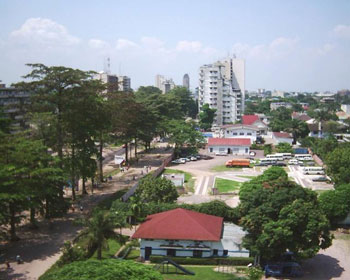DR Congo's small firms bear the brunt of mobile services block

On a normal day, between 20 and 30 clients grace Danny's small Internet cafe in Ngaliema, north of the capital Kinshasa.
Now he gets around 10 a day if he's lucky because the connection is either blocked or sluggish.
"Since this started, we can't earn," says the computer specialist.
"Before I was making 30,000 francs (€28, $32) a day. Now I make less than 10,000 francs. And I (still) pay $180 (€157) for my internet connection."
Between 19 and 22 January, violence engulfed DR Congo during protests against legislation that could have enabled President Joseph Kabila, who has been in power in the troubled country for 14 years, to extend his term beyond 2016 when his second mandate ends.
Rights groups said 42 people were killed with official sources putting the number at 27.
Cut off
To hamper communications and curb further protests, the government ordered a block on phone messaging and the Internet. Main internet services were re-established two days later but mobile internet, used by many small companies and individuals, remained cut off.
Phone messaging, the cheapest way to communicate in the vast central African country, and social networks have remained inaccessible.
On 25 January the election bill, stripped of its most disputed provision, was passed by parliament and calm returned, although the new legislation does little to ease the fears of Kabila's detractors.
The United Nations' chief of mission in the country, Martin Kobler, called on authorities on Wednesday to "restore internet immediately".
Some services like mobile banking, used widely by people to send funds using their mobile phones, were functioning in Kinshasa.
In Bukavu, however, located more than 1,000km away at the other end of the country, the services work only intermittently.
Yves Mukole sells pre-paid telephone cards in the eastern town located on the border with Rwanda, but the lack of SMS facilities and Facebook access has made selling $30 worth of cards a day difficult, while before he would make $40-45.
For Gisele Ndembele, a coordinator at a student travel agency in Kinshasa, work is becoming "complicated".
A step backwards
"We have taken the country back 20 to 25 years," she said.
Without its regular modes of communication like WhatsApp, Viber, Facebook and text messages, communicating with the outside world has become difficult and expensive.

"Now we are having to queue up at Internet cafes and we are losing an hour and a half and spend around $10 a day," said Ndembele.
Internet operators remain powerless in the face of complaints from customers and have yet to communicate the extent of their losses caused by the restrictions.
French operator Orange apologised for the inconveniences via radio, blaming circumstances beyond its control. South African operator Vodacom also issued a similar message.
People, however, have found various ways of bypassing the restrictions although it has meant shelling out more.
Earnings hammered
Nina Mandiangu, who runs a catering business, has changed plans and switched operators, which has meant paying $170 instead of $30.
"Normally, we send our menu to more than 100 customers a day and at least 50 of them order from us. We are unable to send our menu via SMS or email. That has meant an 80% drop in our earnings," she said.
Vital Kamerhe, head of the third opposition party UNC, is a former Kabila ally who is currently one of his most vocal critics.
He has been able to access social networks by setting up "Internet access via satellite like the big embassies", a luxury which costs $700 instead of the regular $200.
To the east of the country, in Goma for example, Internet access is easier using signals from neighbouring Rwanda or Uganda.
In Kinshasa, Gael, a student, says that it is possible to download "applications to unblock Facebook" and access a simplified version of the social network.
Government spokesperson Lambert Mende has since announced that the restrictions would be lifted in "a matter of hours or days" with things returning to normal before the start of next week.
Source: AFP, via I-Net Bridge
Source: I-Net Bridge

For more than two decades, I-Net Bridge has been one of South Africa’s preferred electronic providers of innovative solutions, data of the highest calibre, reliable platforms and excellent supporting systems. Our products include workstations, web applications and data feeds packaged with in-depth news and powerful analytical tools empowering clients to make meaningful decisions.
We pride ourselves on our wide variety of in-house skills, encompassing multiple platforms and applications. These skills enable us to not only function as a first class facility, but also design, implement and support all our client needs at a level that confirms I-Net Bridge a leader in its field.
Go to: http://www.inet.co.za




















